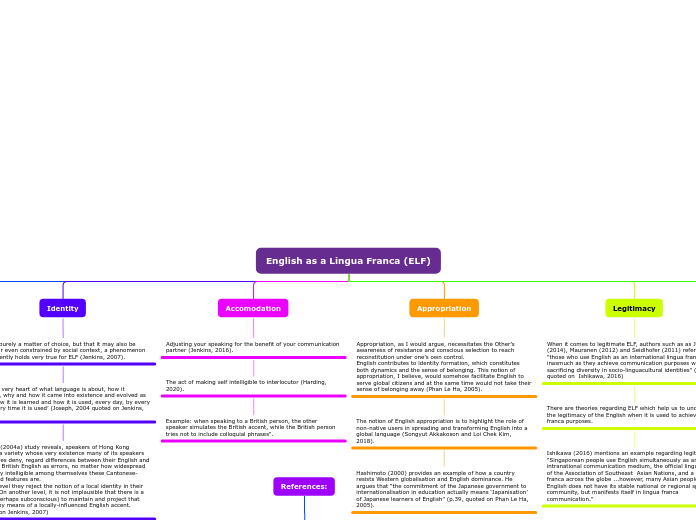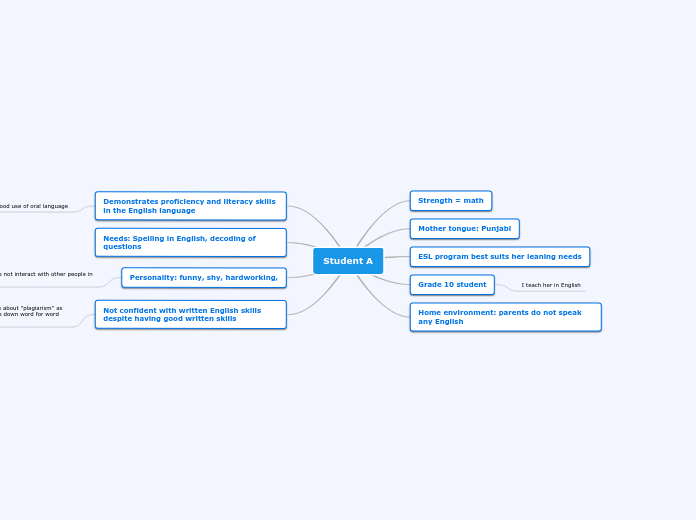Team:
References:
English as a Lingua Franca (ELF)
Acculturation
The process of cultural contact and exchange through which a person or group comes to adopt certain values and practices of a culture that is not originally their own (Cole, 2019).
Pitzl and Osimk-Teasdale (2016) describe an example of acculturation: in "the ELT sector where NESs (native English speakers) are taken as ideal targets, and another one being EMI higher education where international students from diverse linguacultural backgrounds are enforced to stick to native English norms."
Legitimacy
When it comes to legitimate ELF, authors such as as Jenkins (2014), Mauranen (2012) and Seidlhofer (2011) refer to "those who use English as an international lingua franca, inasmuch as they achieve communication purposes without sacrificing diversity in socio-linguacultural identities" (pag 8, quoted on Ishikawa, 2016)
There are theories regarding ELF which help us to understand the legitimacy of the English when it is used to achieve lingua franca purposes.
Ishikawa (2016) mentions an example regarding legitimacy: "Singaporean people use English simultaneously as an intranational communication medium, the official lingua franca of the Association of Southeast Asian Nations, and a lingua franca across the globe ...however, many Asian people’s English does not have its stable national or regional speech community, but manifests itself in lingua franca communication."
Appropriation
Appropriation, as I would argue, necessitates the Other’s awareness of resistance and conscious selection to reach reconstitution under one’s own control.
English contributes to identity formation, which constitutes both dynamics and the sense of belonging. This notion of appropriation, I believe, would somehow facilitate English to serve global citizens and at the same time would not take their sense of belonging away (Phan Le Ha, 2005).
The notion of English appropriation is to highlight the role of non-native users in spreading and transforming English into a global language (Songyut Akkakoson and Loi Chek Kim, 2018).
Hashimoto (2000) provides an example of how a country resists Western globalisation and English dominance. He argues that “the commitment of the Japanese government to internationalisation in education actually means ‘Japanisation’ of Japanese learners of English” (p.39, quoted on Phan Le Ha, 2005).
Accomodation
Adjusting your speaking for the benefit of your communication partner (Jenkins, 2016).
The act of making self intelligible to interlocutor (Harding, 2020).
Example: when speaking to a British person, the other speaker simulates the British accent, while the British person tries not to include colloquial phrases".
Identity
It is not purely a matter of choice, but that it may also be shaped or even constrained by social context, a phenomenon that currently holds very true for ELF (Jenkins, 2007).
‘is at the very heart of what language is about, how it operates, why and how it came into existence and evolved as it did, how it is learned and how it is used, every day, by every user, every time it is used’ (Joseph, 2004 quoted on Jenkins, 2007).
Joseph’s (2004a) study reveals, speakers of Hong Kong English, a variety whose very existence many of its speakers themselves deny, regard differences between their English and standard British English as errors, no matter how widespread and easily intelligible among themselves these Cantonese-influenced features are.
On one level they reject the notion of a local identity in their English. On another level, it is not implausible that there is a desire (perhaps subconscious) to maintain and project that identity by means of a locally-influenced English accent. (quoted on Jenkins, 2007)
Communication in English between speakers with different first languages (Seidhofer, 2005, p. 339 quoted on Harding 2020).
The teaching, learning, and use of English as a common means of communication (or contact language) for speakers of different native languages (Nordquist, 2020).
Example: a French and a Chinese speaker use English to discuss issues related to the organisational climate of the company they work for.









